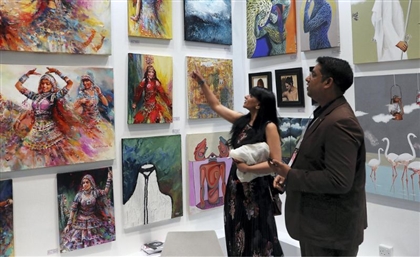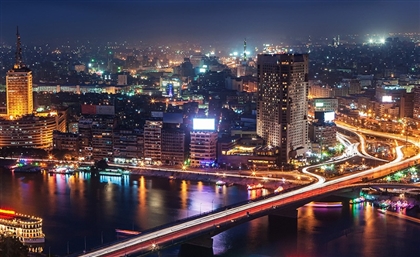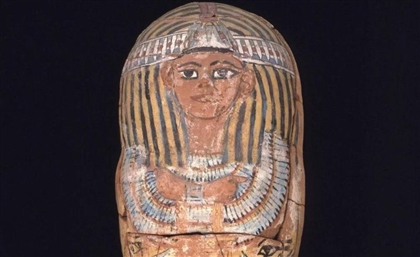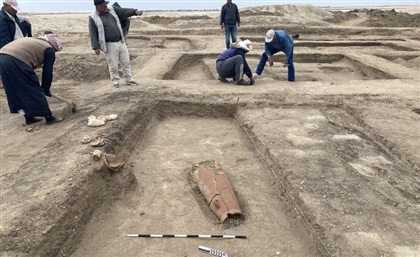Cannes to Cairo: Muhammad Taymour & the Egyptian Film Producers Club
Egyptian producer Muhammad Taymour speaks with us about how his success at Cannes led to a network for filmmakers in Egypt.
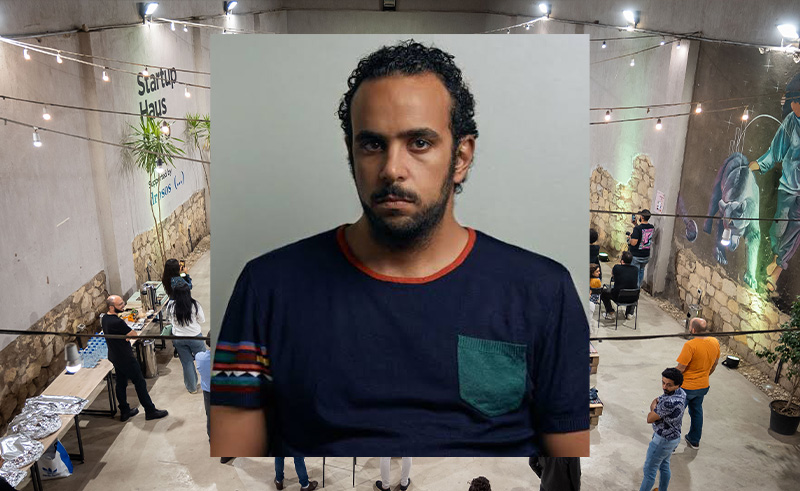
Amidst a clear divide between commercial cinema and auteur cinema in the region, particularly evident in Egypt, stories often find their way to the screen through unconventional routes. While the shortage of funding and opportunity cast a shadow over countless Egyptian filmmakers’ journeys, some manage to break through by forging their own paths outside the mainstream. One such voice is Muhammad Taymour, an Egyptian producer, video artist and filmmaker.
Originally trained as an engineer, Taymour made his debut as a producer with 'I'm Afraid to Forget Your Face' (2020), the first Egyptian film to win the Palme d'Or at the Cannes Film Festival. Through this short film, Taymour began to explore his interest in not only his own potential but also the potential of talented individuals within the Egyptian film industry. Taymour took it upon himself to catalyse change within Egypt's production landscape. This initiative materialised as the Egyptian Film Producers Club (EFPC).
Since its founding in 2021, EFPC has been birthing opportunities and creating community in the midst of a fragmented industry. The club operates in the form of ‘cycles’, bringing together aspiring producers to converse and share their experiences across the filmmaking’s production phases. Initially, Taymour intended to question the lack of film producers in Egypt, and the misconceptions surrounding the role, but what ended up happening was a close-knit community of filmmakers and producers coming together into an organisation run solely on volunteer efforts and passion. The club will soon also create grants for its members, further contributing to the journeys of filmmakers and producers alike.
-60538fab-ae5b-4e9e-a04f-155d0c1cda8e.jpg) We caught up with the award-winning producer where he let us in on his early beginnings, how he believes engineering helped shape his journey and how he worked outside the formal structures of the film industry in Egypt.
We caught up with the award-winning producer where he let us in on his early beginnings, how he believes engineering helped shape his journey and how he worked outside the formal structures of the film industry in Egypt.
How did you start filmmaking and producing, which of the roles came first?
In Egypt, filmmakers often forge their own paths as there's no established guide. I believe my journey resembles that of many others. I initially stumbled into filmmaking without formal education. In 2009, I attended an editing workshop, and that's when I thought I discovered my passion. I worked as an editor for a year. In 2010, I decided to transform this passion into a film.
However, I had no professional writing experience and knew little about scripts. I turned to a friend, an engineer, who helped me write it. Our approach was very spontaneous and mostly ‘wrong’, and our 2011 film, ‘Dayra’ was screened in small Egyptian festivals. Looking back, it may not be a great film, but it serves as a valuable learning experience. Creating it was one of the most fulfilling moments in my life, an indescribable feeling of accomplishment despite the challenges we faced. Our crew was all engineers because I didn't know anyone in the industry, and our lead actor was a civil engineer, whose busy schedule required us to adapt.
Eventually, I began creating more projects and getting into more festivals. Then, I had a strong desire to delve into production. I was intrigued, and although I didn't fully understand how it worked, I was aware that we all possessed natural instincts as producers, especially in Egypt being a producer sort of comes as a package with being an independent filmmaker.
-e858de0f-1a47-41a4-8f6c-df0147f94c43.jpg) Do you think the role of a producer is clear within the region?
Do you think the role of a producer is clear within the region?
Yeah, there's obviously a lot of confusion about what a producer actually does. It's kind of all over the place. I mean, a producer wears many hats and has a bunch of different responsibilities that can overlap. You know, there's this stereotype that producers are just rich folks who throw money at a film, but that's not it at all.
They're more like project managers – they handle logistics and financing, and keep the crew in check. Another way to look at it is as problem solvers, people who are good at fixing things and making deals happen. Thinking back to my childhood, I was always into puzzles, and that's a skill that's come in handy as a producer.
My passion for production grew even more after ‘I’m Afraid to Forget Your Face’, and it's this link between engineering and filmmaking that got me thinking. I wanted to figure out why more people weren't getting into this role. The first time I dipped my toes into production, it felt more like a self-help guide for filmmakers, you know?
How and when did EFPC start?
After receiving the award at Cannes, I found myself inundated with messages from people who seemed to think I possessed some sort of magic touch. To be honest, I was far from convinced and lacked the energy to fully comprehend it all. It took a good six months for the reality of winning at Cannes to sink in, and during that time, it often felt like I was part of a hidden-camera prank show. I spent a significant amount of time in solitude, reflecting on that period of my life and the award itself.
I began pondering why there was such a scarcity of producers and why people seemed reluctant to dive into production. It was during this period that the idea of creating a club started taking shape. I felt there was a need for a space to nurture and cultivate producers, and I couldn't shake the question of why this wasn't happening.
I should note that I didn't have any formal or academic training in filmmaking; self-learning was my main approach. So, I decided to put out a call on Instagram, essentially looking for individuals interested in film production. To my surprise, 30 people expressed their interest in such a gathering or conversation. I went ahead and booked a venue for the meeting, which was scheduled for a Saturday and we ended up maintaining that day. Initially, I thought only 10 people might show up, but when I texted the 70 who had shown interest, 60 confirmed their attendance. In fact, there were so many people that I had to split them into shifts.
Most of the attendees were strangers to me, while people didn't have a clear idea of what they wanted, there was a shared desire for a community or a dedicated space. For three months, we began meeting regularly, and I personally covered the rent for the venue. Eventually, out of the initial 60 attendees, 15 remained as the core group, often referring to ourselves as the club's original residents or founders.
From there, we began working on our goals, establishing systems and forming teams, effectively becoming an organisation unto ourselves with a primary focus on management. Subsequently, we launched our first open call and our inaugural cycle in September 2021. And it’s been two years since.
-8d10d72c-e801-40f0-b64b-2688f8ec5b61.jpg) Given your experience, what usually are the common barriers filmmakers and producers encounter?
Given your experience, what usually are the common barriers filmmakers and producers encounter?
Funding is the first major hurdle we face. It used to be that equipment and education were big barriers too, but technology and the internet have helped with that. However, we still struggle with connections and networking, especially when it comes to finding a reliable crew. Distribution is another challenge; many talented filmmakers have fantastic films sitting on their hard drives, unseen.
From a financial perspective, we mainly rely on self-funding, grants, and crowdfunding, but crowdfunding isn't very common here. The real issue is that everyone's competing for grants, and it's a tough game. We don't have Egyptian funds, we rely on Arab or regional funds, which are often limited by geographic boundaries. So, it's incredibly competitive across the region. The challenge is finding more diverse ways to secure funding. Unfortunately, some people see filmmaking as a luxury, especially in times of economic distress. Finding the right crew is also a time-consuming challenge. Many filmmakers eventually build up that network through time and experience.
Why do you think there’s a lack of producers in Egypt?
I think it’s a challenge to find a producer who thinks of their film as ‘their film’, as it’s not necessarily their creative vision. While I wasn't entirely confident in my abilities as a director, I had certainty in my role as a producer. It's a bit like reconciling with yourself, understanding that the films you produce don't just compete with others but also contribute to your own storytelling. You’re in a different position, yet it's gratifying. Achieving this understanding isn't easy, and I've come to realise that most producers might not share this level of passion.
Because of this, I felt compelled to write statements for my films as a producer, even when it wasn't a requirement. I wanted to articulate why I'm so passionate about bringing these particular stories to life. It's a source of comfort and affirmation for me, a way to align my work with the films I aspire to create.
-e9fcaa05-96fb-437e-b6be-0e0eeaccac86.jpg) What are your goals for EFPC?
What are your goals for EFPC?
We’re not trying to compete with the big shots in commercial cinema or the industry giants. My goal is to connect with up-and-coming filmmakers. We're here to share our knowledge and act as a sort of guide. It's like we all decided to pool our experiences and resources together. It's not so much about academic learning but more about experiential learning. Academic resources on production, especially the producer's role, are pretty scarce globally. They don't really get into the nitty-gritty of what happens on the ground. And when it comes to Egypt, most of the stuff out there is geared towards the US or Europe, so when you try to apply that here, it just doesn't fit.
In the long run, my vision is to establish a diploma program where we can bring in mentors from various countries to educate and train producers – something that's currently lacking in Egypt. This program would serve as a platform for experts to share their knowledge and skills in the various aspects of producing.
An educational program like this, offering a diploma for producers, is quite common abroad. I had the opportunity to attend a similar program as part of the Cairo International Film Festival before, on a smaller scale though. I firmly believe that every producer needs this kind of comprehensive training and it goes beyond the misconception that producers are solely sources of funding.
-548c146f-0d56-4c24-988e-306a5198c8eb.jpg) What kind of mentorship or support does EFPC offer?
What kind of mentorship or support does EFPC offer?
We kicked off in 2021 with a structured approach. We sliced the production process into four parts: development, funding, pre-production and post-production, and distribution. We called these stages ‘Marahel’, which translates to phases in Arabic. Over four months, we dove into all of these phases. It's not an educational cycle; think of it as a club where you become a permanent member, not just someone who gets information and leaves. Every week, starting from May 2021, we gathered for screenings, watching films relevant to the current production phase. We also included pitching sessions and had guest speakers from the industry.
By the end of each cycle, our members got hands-on experience with various aspects of film production. What was surprising was the excitement we generated – not just from the region but across the Arab world. Prominent figures from the industry readily devoted their time and insights to our club. We had influential guests coming in regularly, and they were genuinely thrilled to see such a space. These opportunities are typically rare and confined to festival settings. It was an eye-opener.
How did the club evolve over the past two years?
What I didn't anticipate was that members of the club would form connections. People who met here ended up collaborating on films, and some of those films made it to festivals or secured grants. I think we were able to create an environment for these collaborations. We even contributed to the production of a film. Some of the projects pitched during our club sessions later got accepted at festivals. People learned how to apply for grants, and we developed a tight-knit community – a safe space where they could openly share their experiences and ideas.
Initially, my goal was for us to remain an independent and close-knit community before expanding further.
-0234d3a1-65fe-4250-b36e-87efb14b7073.jpg) How is the club funded?
How is the club funded?
Our funding primarily relies on memberships, which is how we generate income through monthly subscriptions. This revenue stream covers our rent, operational expenses, space maintenance, and sessions. The remaining funds are accumulated and will eventually be allocated to financing and producing films pitched within the club.
Our approach is entirely non-profit. We're planning to have an open call and pitching sessions, with an external committee responsible for assessing projects. It's important for us that the funds continue to serve our core mission. Every member of our team, including our founding partners, operates as a volunteer. We've been at this for two years now, and our model is sustainable, running solely on people's belief in our initiative.
Even when I contemplated shifting to a salary model, my team refused. We firmly believe that the success of any organisation hinges on not relying on a single individual in charge. It's all about collective effort and collaboration, and that's how we thrive.
Trending This Week
-
May 01, 2024





